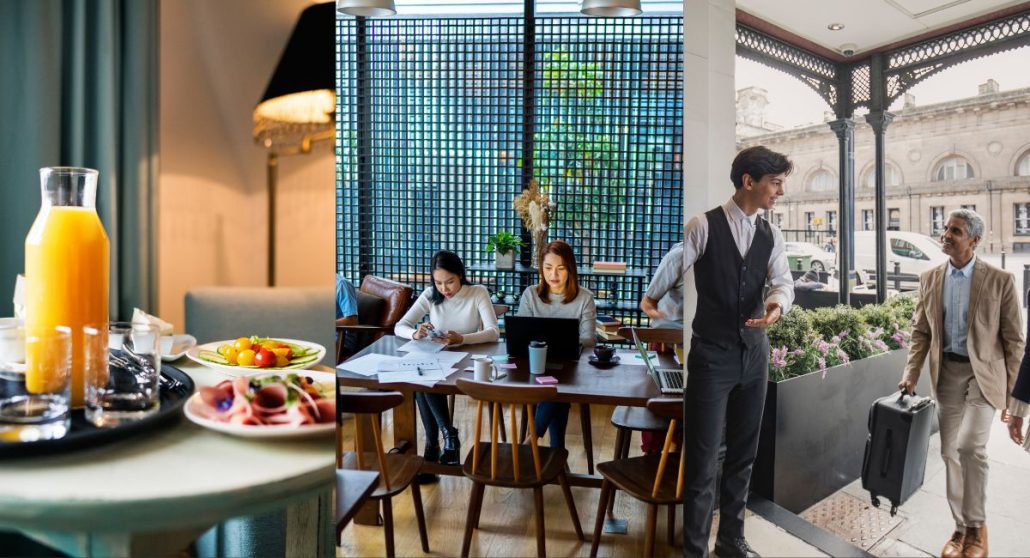The hospitality industry has always been at the forefront of adapting to changing trends and customer preferences. As we approach 2024, it’s evident that the industry is on the cusp of significant transformation.
Staying ahead in this dynamic environment is crucial for hotels, restaurants, and other hospitality businesses.
Let’s look at the emerging hospitality industry trends for 2024 and tips to help you remain competitive and deliver exceptional experiences to your guests.
1. Personalized Experiences:

One of the most significant trends in the hospitality industry is the emphasis on personalization. In 2024, guests are seeking unique and tailored experiences that cater to their individual preferences. To stay ahead, invest in customer relationship management (CRM) systems and data analytics to gather insights about your guests. This information can help you customize everything from room decor to dining options to create unforgettable, personalized experiences.
2. Sustainable Practices:

Sustainability is no longer a trend; it’s a necessity. In 2024, guests will be more conscious of their environmental footprint. Implement eco-friendly initiatives, such as energy-efficient appliances, waste reduction programs, and locally sourced organic ingredients in your restaurant. Promote your commitment to sustainability, and you’ll attract environmentally conscious travelers.
3. Contactless Smart Technology:
The pandemic accelerated the adoption of contactless technology, and it’s here to stay. From mobile check-ins to touchless payment options, guests expect a seamless, safe, and convenient experience. Ensure your hotel or restaurant is equipped with the latest technology to meet these demands.
Smart technology is making waves in the hospitality industry, with the likes of chatbots, robots, and various forms of artificial intelligence gaining popularity. These advancements offer hoteliers the ability to provide guests with instant, personalized information and recommendations. Furthermore, facial recognition technology is revolutionizing the way guests access services, and smart hotel rooms, connected through the Internet of Things, empower visitors to tailor their experience using a mobile app or their voice.
Not to forget online distribution (Cloud-based Channel Manager) is non-negotiable in today’s time.
4. Data Security:
Protecting guest data is non-negotiable. Ensure your systems are secure and compliant with data protection regulations like GDPR. Trust and security are paramount in the hospitality industry. Robust data security measures are essential to safeguard customer privacy, maintain compliance with regulations, and preserve the integrity of the business.
5. Storytelling Marketing:
Finally, embrace storytelling in your marketing efforts. Share your brand’s story, mission, and values with your guests. People connect with brands that have a compelling narrative, and this can set you apart from your competitors.
6. Wellness and Health-Centric Services:
In 2024, the focus on wellness and health will be stronger than ever. Offer wellness packages, fitness amenities, and nutritious menu options to cater to health-conscious guests. Additionally, consider partnering with local wellness providers to offer spa treatments and yoga classes for a holistic experience.
7. Multifunctional Spaces:
Adaptability is key. Multifunctional spaces that can be transformed for various purposes are a significant trend. Create spaces that can host conferences, weddings, and social events, allowing you to tap into multiple revenue streams.
A growing trend in the hospitality industry is the conversion of hotel lobbies and cafes into shared workspace areas. Hotels are recognizing the evolving needs of modern travelers, many of whom seek flexible and comfortable spaces to work and connect while on the go. By offering free Wi-Fi, comfortable seating, and convenient amenities, hotels are not only attracting guests but also business travelers and remote workers looking for a change of scenery. This transformation of traditional hotel spaces into multifunctional hubs reflects the industry’s commitment to meeting the diverse demands of its clientele.
8. Online Reputation Management:
The digital era demands strong online reputation management. Encourage guests to leave reviews on platforms like TripAdvisor, Yelp, and Google. Address feedback promptly and professionally to maintain a positive online image.
Online reputation management has become an essential aspect for businesses to maintain their image and attract guests. The hospitality industry, particularly hotels, heavily relies on guest feedback and online reviews. Hence, hoteliers need to be conscious of their online reputation and use review management tools to monitor and respond to guest feedback effectively. STAAH ReviewMinder is a review management tool to monitor and manage online reputation across multiple review platforms.


